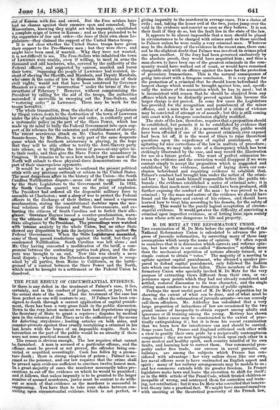THE PURE RESULT OF CIRCUMSTANTIAL EVIDENCE. IF there is any
defect in the treatment of Palmer's case, it lies, certainly, not in the conduct of judge, counsel, or jury, but in the actual state of the law. That the treatment of the case has been perfect no one will venture to say. If Palmer has been con- signed to death through a correct application of capital punish- ment, there has been a very gross fault in the public discussion. Down to the very latest moment we have had deputations ur the Secretary of State to grant' a reprieve ; disputes by medical men in the columns of the Times as to the sufficiency: of the means for detecting strychnine ; leading articles on both sides, and eounter-protests against thus cruelly tantalizing a criminal in his last hours with the hopes, of an impossible respite. Such in- tervention on the part of the public would be an atrocity if there were not some practical reason for it. The reason is obvious enough. The law requires what cannot be furnished. A man is accused of a particular offence, and the offence must be proved or not proved, the offender being con- victed or acquitted accordingly. Cook has fallen by a prema- ture death; there is, strong suspicion of poison ; Palmer is m- ewled as the, poisoner, and our law requires that the crime shall be proved upon evidence sufficient to convince twelve honest men. In a great majority of cases the, murderer necessarily takes pre- cautions to cut off the evidence on which he would be punished ; and it follows, that unless impunity is to be granted to the larger number of accused murderers, juries must be content to do with- out so much of that evidence as the murderer is successful in suppressing. You have then to take your choice between con- victing upon circumstantial evidence which is not perfect, or giving impunity to the murderer in average cases. It is a choice of evils ; and., taking the lesser evil of the two, .juries jump over the void in the evidence and convict as soon as they believe. It is not their fault if they do so, but the fault lies in the state of the law. It appears to be almost impossible that a man should be placed in circumstances to be charged with crimes such as those ascribed to. Palmer unless he were really a very criminal man. Whatever may be the deficiency of the evidence in the recent case, there can- not be the slightest doubt that Palmer was involved in crimes piled one upon another. If the Jury had been governed exclusively by the absolute proofs they would have acquitted him ; and thus a man shown, to have been one of the greatest criminals in the com- munity would have walked out of court, or would' have remained chargeable only with an offence against the laws for the protection of pecuniary, transactions. This is the natural consequence of going into court with a foregone conclusion. It is very proper for the protection of a criminal that he should know beforehand the largest charge which would be brought against him; and, specifi- cally the nature of the accusation which he has ,to, meet ; but it is inconsistent with reason that he should be absolved from any offence which may be distinctly proved against hire. because the larger charge is not proved. In some few cases the Legislature has provided for the recognition and punishment of the minor offence, and a man who is not convicted of a c,rime of violence
may be convicted of attempt or of assault ; but still coming into court, with a foregone conclusion slightly m
II
The state of the law, therefore, requires that a profkisition should be established, but permits it to be established by evidence that does not strictly meet it. At a moment when the public would have been offended if one of the grossest criminals ever exposed had been let off, it is the worst of tines to raise theoretical questions upon the expediency of capital punishment, or of agitating for nice corrections of the law in matters of procedure ; nevertheless, we may take note of a discrepancy which has been strikingly illustrated by the case, and may record the illustration for use at a future period. The want of perfect connexion be- tween the evidence and the conviction would disappear if we were content simply to accept the proposition which is suggested and established by the evidence, instead of laying down our con- clusion beforehand and requiring evidence to establish that Palmer's conduct had brought him under the notice of the crimi- nal law ; he had made himself responsible before the public tri- bunals ; the evidence established a series of criminal acts ; it is notorious that much more evidence could have been Produced, still further exposing the conduct of the man : he was proved to be a criminal ; by the mass and nature of the evidence we should have found out the degree and extent of his crimes, and should have learned how to treat him according to his deserts, for the safety of society. This would be the purely logical acceptation of circum- stantial evidence. It would get over the difficulty of convicting criminal upon imperfect evidence, or of letting loose-upon society a man whose acts are dangerous to life and property.


























 Previous page
Previous page